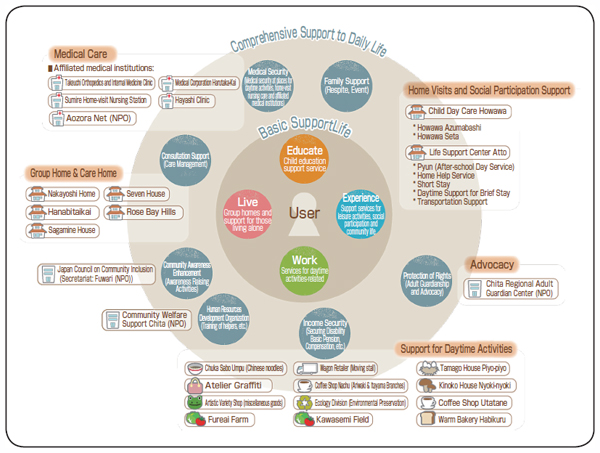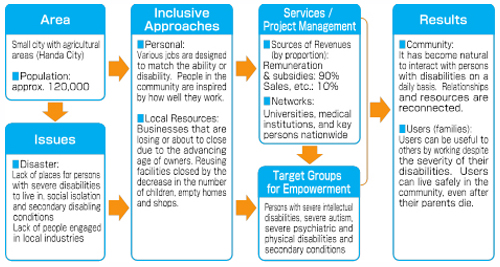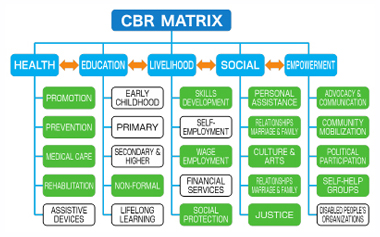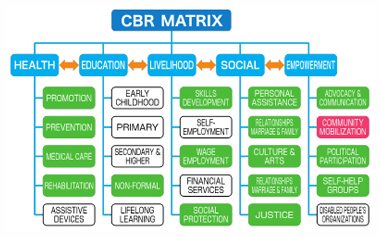Community-Based Inclusive Development
CBID Good Practices
Musou (Social Welfare Corporation)
(Handa City, Aichi Prefecture)
Key Words Normalization of Persons with Severe Disabilities A Comprehensive Approach
Twenty-four hours a day, 365 days a year, Musou has been implementing a system of providing various services to persons with disabilities that enables them to work and live ordinary lives in the community, regardless of the severity of their disabilities. One service, in particular, provides support for their daytime activities by creating the appropriate kind of workplace according to the characteristic of the disability. Musou has remarkably achieved, not only in providing employment and empowerment for individuals to live independently, but has also contributed to the redevelopment of the shopping district, which used to have many closed shops due to population aging, the prevention of social isolation and secondary conditions caused by disabilities, and the promotion of understanding of disabilities, thus stimulating the local economy and enhancing the community’s awareness of disability issues.
◆Background
If someone has to suffer poverty and face discrimination because he/she has a family member with a disability, then the social welfare system is not good enough. Musou was created on the basis of such awareness and thus has been endeavoring to raise the standard of welfare to an international level whereby persons with disabilities can be mainstreamed into the community and live like everyone else, regardless of the severity of their disabilities.
◆Service Outline
Aware of the disadvantages of large-scale institutions in the welfare system, Musou opened a group home for a small number of people with disabilities and created a place of employment for them to work according to their residual capacities. Musou aims for the empowerment and economic participation of persons with disabilities in the community by creating a place for them to live and work like other human beings.

Basic Data
●Coverage Area: Handa City, Aichi Prefecture (small city with agricultural areas)
●Population: about 120,000
●Issues: Shortage of places where persons with severe disabilities can live in, leading to their social isolation and further disabling conditions
■Year of Establishment
A non-statutory organization formed in 1999, Musouu became a specified non-profit corporation in 2000. It then became a social welfare corporation in 2004.
■Contents of Services
●Objectives: Community support 24 hours a day, 365 days a year for persons with disabilities ranging from children to adults.
●Purpose of Services and Target Groups: Musou promotes the creation of places for persons with disabilities to live and work by involving the local community as it considers how each particular person’s disability needs can be matched by available community resources. Thus, even after parents die, persons with severe disabilities can continue to live their lives as fully as possible.
●Stakeholders:
- 150 persons, including persons with disabilities and their families
- Staff members who initiate projects and service support staffs
- Customers at the working places of persons with disabilities
- People in the community
●Main Source of Revenue: Remuneration from long-term care services and from employment support services for persons with disabilities, grants and membership fees
●What We Have Implemented: In Nachu-field, there are places of employment such as Coffee Shop Nachu, Tamago House Piyo-piyo (open-space poultry farm), and Kinoko House Nyoki-nyoki (a Shiitake mushroom growing facility). In these places, each person with a disability is given a role in the work process depending on the type/extent of the disability, personal interest, and strengths.
■Special Festures
■Practice of Normalization and Establishment of a Local Community System
Musou is keenly aware that conventional institution-based welfare is wrong – the type of welfare where persons with disabilities are put together in one place being trained to do what they cannot do anyway due to their disabilities. However, it has been able to put into practice the theory that persons with disabilities can live happily like other human beings in ordinary homes, provided these are fitted or renovated with minimal accessibility (such as a accessible bathroom, a place to rest, etc.) and with a system which allows disabled persons to utilize their strengths according to their preferences and the nature of their disabilities.
■Utilization of Local Resources
Instead of spending billions of yen building a large-scale residential institution, Musou uses vacant houses and shops as facilities for persons with disabilities.
Musou creates employment opportunities for them by providing equipment and marketing channels taken over from retiring business owners due to old age, and also from entrepreneurs who withdraw from unprofitable businesses. By utilizing these resources, Musou creates a system where users can work at their own pace according to the nature of their disabilities. This way, Musou also minimizes the risk of starting a new business.
■Development of Employment Support Service into as a Communication Tool
People in the community are encouraged to have a new perspective of persons with disabilities when they see persons with disabilities working in town on a daily basis rather than staying at an isolated institution. As regular customers of a shop where users work, they also become exposed to the severity of their disabilities.
In the case of disabilities that cannot be recognized easily such as autism, promoting the right understanding of its nature could change people’s way of thinking from “How do we make them normal?” to “How should we change ourselves so they could live normal lives?”
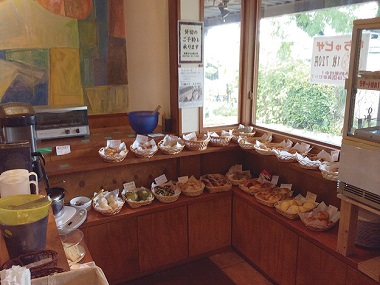
At the corner of the Itayama Branch of Coffee Shop Nachu, various kinds of freshly-baked bread are sold. Displayed on the shelves facing the corner are bamboo charcoal and bamboo vinegar, products of Itayama Bamboo Charcoal Study Group.
■Ripple Effect (Project as a Model)
The long-term care service is under the system established by the national government. Therefore, the system used is the same everywhere in Japan. However, how the people in the community want to use the service differs from one place to another. Musou made its service a business model that can easily be duplicated and used in other communities. First Musou needs to gather detailed information on service users’ various needs and backgrounds. Second, it needs to train its staff members further on how to provide proper support. Musou also aims to disseminate its business model to be applied in different communities.
Basically, what Musou has established is a support model that enables users to be integrated in the community no matter how severe their disabilities are. As the awareness of parents with children with disabilities has changed into thinking that living ordinary lives is better than receiving special treatment, the services they choose have changed accordingly. Consequently, new social welfare corporations and NPOs are said to have emerged as Musou’s competitors. It is also noteworthy that some of them place an importance on advocacy work for those who cannot express themselves, and because of that, Musou helped create the adult guardian system for them. It seems that Musou’s endeavor has triggered some changes that has made Handa City a place where social exclusion due to disabilities is minimized.
◆How Things Changed
●Working on Individuals
As mentioned earlier, Musou’s corporate mission is providing various services to persons with disabilities, 24 hours a day, 365 days a year, to enable them to live as they wish, regardless of the severity of their disability. Although many service users are with severe behavioral disorders, Musou prepares and provides custom-made support services based on a detailed assessment conducted for all users. The users of Musou are not expected to be just there doing nothing, even though they have severe mental and physical disorders. They should be engaged in daytime activities playing some unique role, such as smiling at customers beside a cashier in the variety store. The philosophy of Musou is to treat persons with disabilities as normally as ordinary members of the community regardless of the severity of their disabilities. When you see their smiles and those of their visiting friends in Musou, you can see that the effect of this philosophy and policy is invaluable.
●Working with Communities
Musou’s business establishments are strategically scattered in various places around Handa City to prevent persons with disabilities from being associated with only one place and so as to make them more visible everywhere. One of the establishments, Coffee Shop Nachu - Itayama Branch, was established as a place of employment. There are regular customers who come for freshly baked bread for breakfast or lunch, and sometimes when the shop is short-handed because the staff has to go out for some urgent matters, some regular customers volunteer to take care of the shop.
Beside a big Sendan (chinaberry) tree that extends its branches as if it covers over Coffee Shop Nachu, there are two kilns. They have been used for a long time by the Itayama Bamboo Charcoal Study Group, a volunteer group, which was established in the Itayama Community Center almost concurrently with the establishment of Musou. They made charcoal at this Sendan Kiln and carried out various community activities, including the purification of the Godo River water flowing in the region. Aside from bamboo charcoal that is used as an insecticide for gardening, bamboo vinegar is also extracted as a by-product that is used as a bathwater additive. Both are sold at the Coffee Shop Nachu. The Study Group members saw the Nachu staff devotedly giving support to clients with disabilities. Before long, they started joining the staff saying, “We cannot just stand by doing nothing.” Some of them said, “Seeing the staff members working with persons with disabilities attracted me,” “I discovered a new aspect about myself through interactions with young people.” At the same time, as the business got bigger, some people got concerned that the staff might get tired of working in the community, or that they might feel it troublesome to communicate and relate with persons with disabilities, or that the staff might regard them merely as paid workers, or that some staff member might become too exhausted to continue and thus leave. This means that not only has the local community come to accept the philosophy of Musou that persons with disabilities must live in the community, but has also embraced it.
■Current lssues and Way Forward
A community cannot accept the radical philosophy of Musou unless people’s sense of values change. Mr. Hiromoto Toeda, President of Musou, believes that “consumer education” is important, as service users should patronize only good quality services. Thus, the quality of life of the users is gained only when services and service-providers are selected carefully. That is when “community comprehensive care” in which anyone can receive comprehensive life support as necessary is materialized. At the same time, creating a mechanism for advocacy as well as consumer education will be just as important. In particular, advocacy for persons with severe intellectual and physical disabilities who have difficulty in communicating and who are not able to properly select services best for them should be addressed along with other consumer education issues.
■Analysis Using the CBR Matrix
◆What was covered by Musou
The activities conducted by Musou in Handa City have covered almost all of the CBR matrix, except for those that should be provided by special institutions such as education, the development of assistive devices, and financial services.
◆What Musou aims for
The activities of Musou are varied. However, the main thrust can be best described as “empowerment.” Apparently, to “mobilize the community” is the principal strategy of Musou. Various people are involved such as staff members, who come together to support persons with disabilities, and people like members of the Bamboo Charcoal Study Group. Their activities may seem to mobilize the community, but the real driving force behind these activities is the existence of persons with disabilities, which is a means of communication. Musou’s role is about creating places, opportunities and a mechanism for the inclusion of persons with disabilities in the life of the community.

